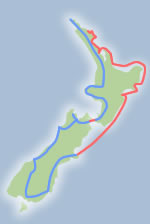
Americans fear and despise Vegemite. There are Americans who think that Vegemite is inexorably linked with swine flu and the rise of the Taliban. My husband believes it is poison. I put a dab in his mouth the other day, and he started to scream. “HELP, HELP!” he shrieked. “IT’S BURNING A HOLE IN MY TONGUE!”
He is seriously missing out.
Like many victims of baseless persecution, Vegemite is misunderstood. It is really just brewer’s yeast and salt. I didn’t like blue cheese either, the first time I tried it. Each time my father slathered a slice of bread with liquid mold and brought it reverently to his mouth, I was convinced he was about to die. The fumes alone were enough to make me run screaming from the room.
But many of the best things in life take getting used to. Dry martinis, for example, and shaved white truffle. The first time I tried wasabi, I nearly had to be hospitalized. As a California girl, I just assumed the bright green ball on my plate was guacamole, and popped it in my mouth. Once I emerged from cardiac arrest, the grown-ups explained that wasabi is an extremely strong condiment. In large quantities it is a biological weapon. You must use it sparingly.
 And so it goes with Vegemite. The classic error that so many travelers make when they try Vegemite for the first time is that they slather it on their toast like peanut butter. Then they bring this abomination to their lips, eagerly anticipating their first authentic taste of the Southern hemisphere. A half an inch of Vegemite is about as delicious as a mouthful of bleach. They gag, they sweat, they run screaming from the room. And this is how those rumors about the Taliban get started.
And so it goes with Vegemite. The classic error that so many travelers make when they try Vegemite for the first time is that they slather it on their toast like peanut butter. Then they bring this abomination to their lips, eagerly anticipating their first authentic taste of the Southern hemisphere. A half an inch of Vegemite is about as delicious as a mouthful of bleach. They gag, they sweat, they run screaming from the room. And this is how those rumors about the Taliban get started.Vegemite is not peanut butter, and it certainly is not Nutella. Like a dry martini, Vegemite will make you feel splendid in small quantities. And too much will bring you to the edge of complete annihilation.
Vegemite, you see, is umami. It is the essence of savoury salt, with the slightest hint of sweet. Many cultures have this intrinsic element in their menus. The Italians have several: Parmesan cheese, anchovies, and salt cod would all be examples of umami. Try making a entrée out of those three, and you’ll go into anaphylactic shock. But you don’t see people blaming swine flu on the Italians. That’s because they’re not stuffing submarine sandwiches with anchovies, salt cod and melted Parm. If they were, we’d see a world-wide pandemic that would make swine flu look like the sniffles.
 My favorite way to eat Vegemite is to apply a light film over a sandwich made with chunks of good cheddar cheese. It puckers my mouth like a strong Caesar salad, and it goes deliciously well with a cup of sweet, strong tea. Silas, for his part, favors the bite-size cream cheese and Vegemite sandwich. He is a born Kiwi, so this is only natural. Also, he is a baby, so he doesn’t have much choice in the matter.
My favorite way to eat Vegemite is to apply a light film over a sandwich made with chunks of good cheddar cheese. It puckers my mouth like a strong Caesar salad, and it goes deliciously well with a cup of sweet, strong tea. Silas, for his part, favors the bite-size cream cheese and Vegemite sandwich. He is a born Kiwi, so this is only natural. Also, he is a baby, so he doesn’t have much choice in the matter.Peter, on the other hand, is the stubborn one. He has compared Vegemite to axle grease, shoe polish, and teak oil. In my efforts to convert him, I have had to resort to the age-old feminine technique of subterfuge. So far, I’ve snuck Vegemite into baked beans, meat marinade, and beef stew. Despite his best efforts, Peter’s palate is slowly being educated.
Next up, the Vegemite martini. The Vegetini. I predict it will take the world by storm. Failing that, it could probably take out the Taliban.







































